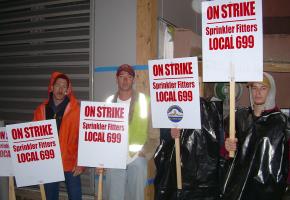Strike shuts down Seattle building sites
By and
SEATTLE--A strike by 300 fire sprinkler installers, members of the United Association of Plumbers, Pipe Fitters and Sprinkler Fitters Local 699, has shut down construction at most large construction sites here and Bellevue, Wash.
The strike began at midnight July 1. Since then, at least 40 construction sites in the Seattle area have been shut down, idling some 20,000 other union construction workers who have honored the picket line. The total strike area covers seven counties in western Washington.
The strikers know what they are up against. Sam Bond, a member of Local 699 for nine years, said in an interview, "We have got to keep up with what's going in the world. As prices go up, we have to stay up on it, so we can afford the lifestyle we want to live. This strike is really important for us, and for future generations of sprinkler fitters."
Ironworkers, electricians, laborers, operating engineers, as well as delivery drivers like UPS workers are just some of the union workers who have refused to cross the picket lines.

At the Microsoft campus in Redmond, Wash., the strike has shut down completely nine huge tower cranes, with upwards of 800 workers getting an unexpected extra long holiday weekend.
The union is reporting that not a single member has crossed the picket line so far. A strike authorization vote was unanimous, and the "last, best and final" offer from the employers' organization, the National Fire Sprinkler Association (NFSA), was voted down 219-14.
It's been nearly two years since a major construction-workers strike hit the Seattle area. In August 2006, concrete workers who were members of the International Union of Operating Engineers Local 302 paralyzed most of the industry for a month. Those workers won a contract that included pay raises of $3.95 an hour over three years and, crucially, allowed them to honor strike picket lines held by other union trades.
The importance of that strike victory is now magnified. The basic labor idea of "an injury to one is an injury to all" has been highlighted by the solidarity of all the building trade workers refusing to cross the sprinkler fitters' picket line.
As one Local 699 striker put it, "The support we're getting is unbelievable. To be able to have all the trades honor the picket line also helps them out more when their contract times come up."
ONE OF the major issues in this strike is the length of the contract. The NFSA is demanding a four-year contract with a wage and benefit package worth $14 an hour over the life of the contract. The union wants to maintain a three-year deal.
This is important for a couple reasons. Currently, the workers' contract ends right after the plumbers' contract, which gives them leverage. The United Association Plumbers and Pipefitters Local 32 recently ratified a deal with a wage and benefit package of $13 for three years.
In addition, Ironworkers Local 86 workers are voting by mail ballot on a three-year contract proposal with raises of only $7 over three years. The local is recommending a "no" vote. Ballots will be counted July 18.
A four-year contract would weaken the strikers' ability to build solidarity with the plumbers' and ironworkers' unions in the next round of contract negotiations. Also, it would mean the contract would expire in the same year as the Local 699 election for officers, which would distract the union from focusing its energies on the bosses.
The other major issue in the strike regards strengthening the contract language applying to apprentices, who currently have a lower-tier health care plan. The union wants to end it and pull them into the same plan as journeymen workers. The union also wants to increase apprentice starting pay from 42 percent of journeymen pay to 45 percent.
For its part, the NFSA is trying to increase the number of lower-wage apprenticeships and is demanding random drug testing for them. The union opposes both of these proposals.
Finally, the union is asking for contract language that would include the inspection and testing of sprinklers as part of job requirements, in order to prevent nonunion workers from taking their work.
The NFSA is trying to roll back the gains of Local 699, which has seen its share of the fire sprinkler industry grow from 51 percent union in 1997 to 82 percent today. You can see why the union succeeded by looking at the $55 an hour total wage and benefit package for journeymen workers.
But this is deceptive. First, there is no separate vacation or holiday pay in their contract. Also, $7 an hour goes to health care. Other parts of the package go to the apprenticeship fund, dues, and pensions.
Then there's 45 cents an hour paid into the "industry promotion fund," paid directly to the contractors. The bosses can write this off on their taxes and use the money to "promote" their industry. In other words, it's money that should go into wages that is being used by the industry to fight the union. The union wants to eliminate the "promotion fund" while the NFSA wants to increase it to 55 cents an hour.
This strike is also a test--in the context of the slowing economy and especially the downturn in the housing market--of whether a building trades union can maintain, if not, increase the quality of its contract in a recession.
Dan Cochran, an organizer for Local 699, summed up the stakes of the strike. "Our strike can set an example for working people," he said. "This shows that you're not afraid to strike, even when the economy is getting bad. It shows that there is power in that strike, that people can make changes, and that they shouldn't be afraid. Because that's what they (bosses) want. They want fear to inundate us, to stop us. We have been battling that for a long time."


